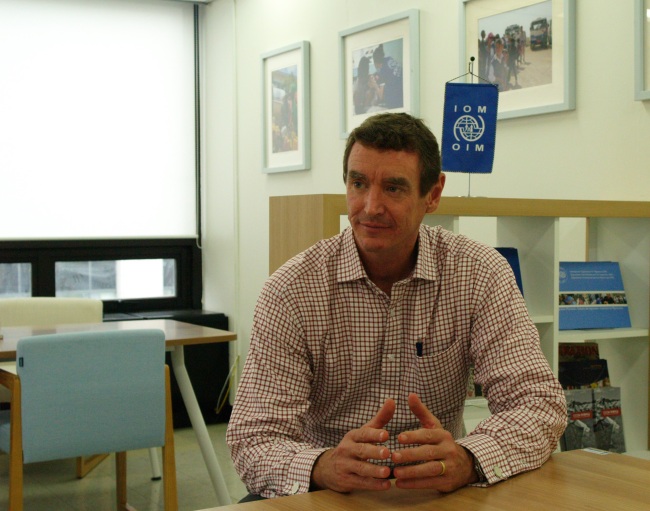Korean companies’ role crucial in combating labor abuses in Asia
By Ock Hyun-juPublished : Oct. 11, 2016 - 16:48
In recent years, various reports have shed light on the “modern-day slavery” behind the global supply chain of frozen prawns and cheap clothes -- how millions of workers in Asia are trafficked into forced labor and endure excruciatingly long hours for low, if any, pay.
David Knight, an international migration expert, says in combating this, Korean companies have a role to play.
“Companies may not be aware of human rights abuses in their supply chain and sometimes there is a gap between what they are told and what happens in practice,” said Knight, chief of Vietnam Mission for International Organization for Migration, in an interview with The Korea Herald in Seoul.
“But those companies are still responsible and held accountable for any breaches of human rights abuses through their supply chains.”
David Knight, an international migration expert, says in combating this, Korean companies have a role to play.
“Companies may not be aware of human rights abuses in their supply chain and sometimes there is a gap between what they are told and what happens in practice,” said Knight, chief of Vietnam Mission for International Organization for Migration, in an interview with The Korea Herald in Seoul.
“But those companies are still responsible and held accountable for any breaches of human rights abuses through their supply chains.”

He noted that as the supply chain is often complex with multiple layers from treating raw materials to creating final products, it has become more difficult for companies to monitor exploitation and abuses at a myriad number of their subcontractors.
That’s why the IOM stresses companies’ “proactive” role in monitoring its supply chains and following ethical recruitment practices. The ethical recruitment means that migrant workers are not charged fees to find work abroad, granted freedom of movement and clearly aware of terms and conditions of contracts.
The IOM helps companies to conduct audits with a more investigative approach to uncover human rights breaches, offers training sessions to raise awareness of ethical recruitment among lower tier suppliers, he said.
Knight, who is leading the IOM’s initiative International Recruitment Integrity System based in Vietnam, made his way to Korea last month to participate in a forum to address risks about hidden forced labor in supply chains and adverse impact it could bring to Korean businesses.
In Vietnam, where about 4,000 Korean-owned companies are operating as of 2016, mostly in the manufacturing sector, some Korean firms are directly involved with labor abuses.
According to Vietnam General Confederation of Labor, there have been about 800 strikes from 2009 to 2014 by workers in Vietnam against breach of labor laws by Korean employers.
A 2015 report by Korean Trans National Corporation Watch based on interviews with local workers, labor unions, companies and civic groups, revealed that Korean companies allegedly underpaid local workers, verbally and physically abused them, forced them to work long hours and even punished them for using toilets too often.
Even if Korean companies are not directly involved, being associated with charges of human trafficking and forced labor through subcontractors and recruitment agencies is a risk for their business, Knight said.
“By failing to follow the ethical recruitment in labor migrations, companies may not be able to access the US and EU markets because of slavery that was found in their supply chains,” he said, citing the California Transparency in Supply Chains Act enacted in 2010 and the UK’s Modern Slavery Act enforced in 2015.
Both acts require companies supplying goods and services in California and the UK, respectively, to publish annual statements to prove that there is no slavery or labor abuses linked to any goods and services sold there.
“The corporations might also suffer from reputational damage, penalty for violation of laws and declining sales,” he said. “By addressing these issues and doing things in the right way, they can reduce those risks and brand themselves as a promoter of human rights and sustainable development.”
By Ock Hyun-ju (laeticia.ock@heraldcorp.com)
That’s why the IOM stresses companies’ “proactive” role in monitoring its supply chains and following ethical recruitment practices. The ethical recruitment means that migrant workers are not charged fees to find work abroad, granted freedom of movement and clearly aware of terms and conditions of contracts.
The IOM helps companies to conduct audits with a more investigative approach to uncover human rights breaches, offers training sessions to raise awareness of ethical recruitment among lower tier suppliers, he said.
Knight, who is leading the IOM’s initiative International Recruitment Integrity System based in Vietnam, made his way to Korea last month to participate in a forum to address risks about hidden forced labor in supply chains and adverse impact it could bring to Korean businesses.
In Vietnam, where about 4,000 Korean-owned companies are operating as of 2016, mostly in the manufacturing sector, some Korean firms are directly involved with labor abuses.
According to Vietnam General Confederation of Labor, there have been about 800 strikes from 2009 to 2014 by workers in Vietnam against breach of labor laws by Korean employers.
A 2015 report by Korean Trans National Corporation Watch based on interviews with local workers, labor unions, companies and civic groups, revealed that Korean companies allegedly underpaid local workers, verbally and physically abused them, forced them to work long hours and even punished them for using toilets too often.
Even if Korean companies are not directly involved, being associated with charges of human trafficking and forced labor through subcontractors and recruitment agencies is a risk for their business, Knight said.
“By failing to follow the ethical recruitment in labor migrations, companies may not be able to access the US and EU markets because of slavery that was found in their supply chains,” he said, citing the California Transparency in Supply Chains Act enacted in 2010 and the UK’s Modern Slavery Act enforced in 2015.
Both acts require companies supplying goods and services in California and the UK, respectively, to publish annual statements to prove that there is no slavery or labor abuses linked to any goods and services sold there.
“The corporations might also suffer from reputational damage, penalty for violation of laws and declining sales,” he said. “By addressing these issues and doing things in the right way, they can reduce those risks and brand themselves as a promoter of human rights and sustainable development.”
By Ock Hyun-ju (laeticia.ock@heraldcorp.com)
-
Articles by Ock Hyun-ju



















